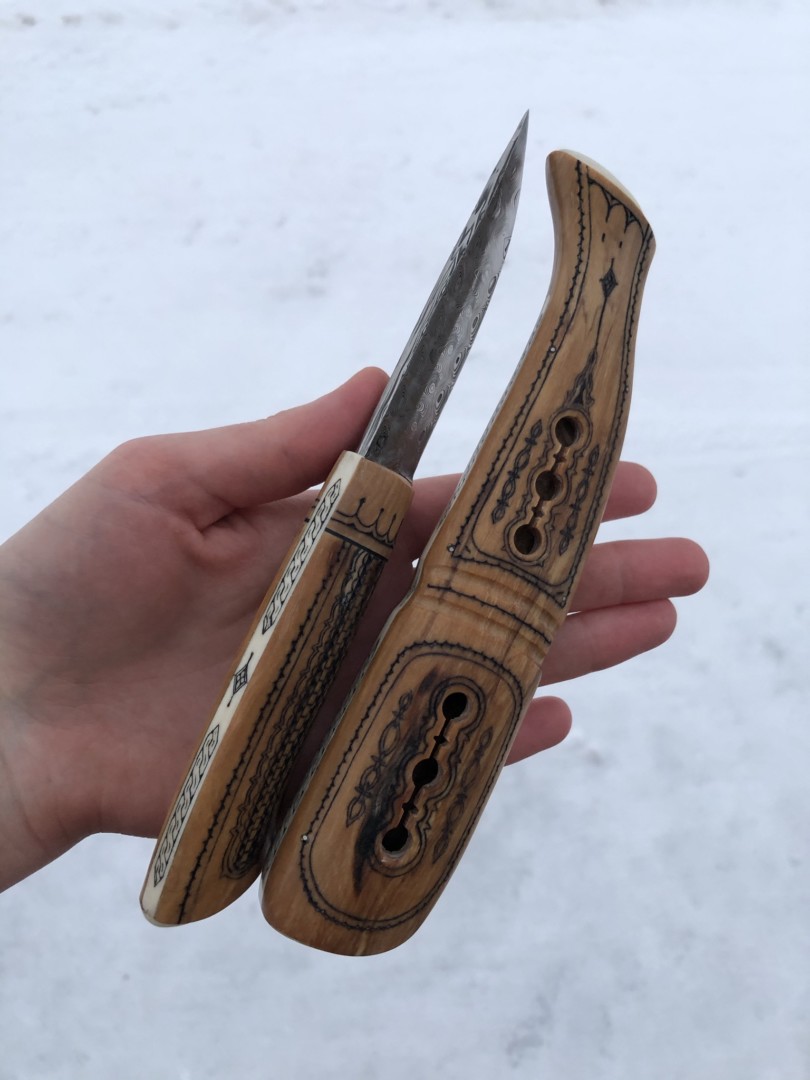I wish to take this opportunity to thank all of you - colleagues, friends, guests, clients, that was part of this different kind of year. Thanks to you, knowing that we are all in this together, it was easier than going through it alone.
Last week, I met my friend and colleague Mr. Sixten Keisu, who just turned 80 years old, and he told me more about his life, his not so easy childhood, and the key to a happy and creative life - friends, and doing what you like to do. Sixten is an exceptional at Duodji (Sami handicraft), and he has competed in both national and international handicraft competitions, which all result in excellence. His eyes glows when he talks about his work, and he shows me a few of the latest works he just finished. I ask him, how much time he spends in his work shop, because it is apparent that the pieces requires a tremendous amount of work. "Oh, normally about 12 hours per day", Sixten says. "It is so much fun I can't stop." He also teaches in a local handicraft club, where students and friends from both Finland and Sweden meet every week. Some of them drive close to 300 km to the weekly event!
An other hobby that keeps Sixten active, gets him outside in nature and provides him with a lot of social contact is reindeer herding. The reindeer herders (again both from Finland and Sweden) all work together and help each other when needed, it is a question of life style. Sixten is of Sami origin, and because of this he has the right to own a reindeer earmark and keep reindeers in Sweden.
Sixten's maternal ancestors where Sami people (family name Pokka) from Northern Sweden, and his paternal ancestors (Keisu) originated from Germany and came through Finland to what today is Sweden to look for new land. The family with 7 children led a simple life in the very small village of Pyhäjärvi, their livelihood they made from forest work and cattle. Their home language was Meänkieli (minority language in Sweden with Finnish origins).
When Sixten was 7 years old his life changed completely from how he knew it. His father put him on the back of his bicycle and took him to the nearest village Svanstein about 15 km away. He hadn't been told, but that day he moved away from home to go to boarding school. The school was a "work home", where children from small forest villages far away where sent to attend school. In the school, the children lived, studied and worked. They were allowed to go home for holidays a only few times a year.
The experience of the work home/school was harsh. Sixten didn't know any of the other children or the teachers when he started school. In school, they were only allowed to speak Swedish. Sixten didn't know one word of Swedish when he started school, and if the children didn't speak Swedish they got severe punishments. The State tried their best to forbid the children and villagers to speak their native language. Today, the generation that Sixten belongs to still speak the language Meänkieli, but most of the younger generations only speak Swedish. Without much success, Sixten tried to run away from the work home/school.
After finishing the compulsory school, Sixten moved back home for a while and helped his father with forest work. Soon after he moved away to study to become a carpenter. During his adult work life, he moved around in northern Sweden working as a carpenter in the different towns and regions. When he retired he moved back to his childhood home, working in the forest, herding reindeer, and, of course making Duodji handicraft.
I ask him about his Sami blood, and about his cultural upbringing. Apparently he received a Christian upbringing, and the Sami culture and mythology was not very much spoken about. But the culture was naturally still there without needed to be talked about. Sixten remembers particularly his grandmother, who was very small, dark, with long black hair. She didn't talk a lot, as was common for Sami people, but when she spoke her words was the law.
The same way as some of Sixten's ancestor's, he also has the ability to see true dreams. This ability is something he like to keep to himself, as often the message is the dreams is not very positive. However, sometimes he may also see dreams about coming future events that are important. He never like to talk about the message in the dreams with anyone, at least not before the event has already taken place.
As Sixten already has turned 80 years old, has a lot of life experience and still leads a very active, social and meaningful life, I wonder if he has any message as from "an old wise man". He smiles, eyes glitters again. "Be humble" he says, "feet steady on the ground. And remember friendship".
To all of You - from all of us at Valkea - we wish You a very Merry Christmas, may You be well and happy.
- Mia Bonn




